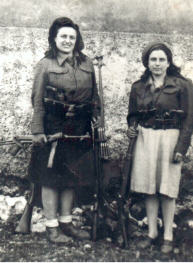Zampia
Manousaka Marinos
Our
mother was born and lived in the village of Melidoni on the island of Crete.
She was twenty years old when World War II engulfed Europe.
Greece entered the war in
October of 1940. Italy, which had overtaken Albania, was massing troops
along the border with Greece. Mussolini issued a demand for immediate
surrender by the Greek government; otherwise, he claimed that in twenty-four
hours he would conquer Greece and be drinking his coffee in Athens. Greece
refused to capitulate. Mussolini's forces invaded and the conflict began.
The Greek forces fought the Italians for seven months. They pushed back the invading army
and took over the Albanian territory previously occupied by the Italians.
Germany
rallied to the aid of its Axis ally and began fighting Greece in April of 1941.
The German war machine was able to defeat Greece in two months. Zampia
was quite proud that, although the entire nation of France fell in two weeks,
her island alone lasted thirteen days before being captured.
With
the government exiled in Egypt and the Greek mainland and islands under Nazi
occupation, the Greek armies fled into the mountains and fought as guerrillas.
The
German occupiers were brutal with the local population. Zampia told stories
of groups, and sometimes entire villages, of men being marched out to fields,
where they forced to dig pits, and then machine-gunned into the mass graves.
Allied
forces, mainly British, smuggled supplies to the guerrillas. Zampia carried
supplies on her back and cooked food for the guerrilla encampments.
Two opposing movements emerged
in the underground resistance to the Nazi occupation forces. One resistance
movement was loyal to the Greek republican government in exile. The other
group aligned itself with Communism. The British provided aid to both
factions.
By February of 1945, the
Nazis were losing their grip on the island of Crete. The larger cities
were still controlled by the Germans. Much of the rural areas were not
under direct Nazi influence. The opposing Greek resistance forces battled
for control of the countryside.
The
men of Melidoni had been drafted and were scattered throughout the country,
involved in guerrilla fighting. Our mother's brother, Nico Manousaka,
was a captain in the Greek republican resistance. As World War II drew
to a close, civil war erupted in Greece between the Communist insurgents and
Greek royalist forces.
One
day, approximately 300 communist guerrillas approached the village of Melidoni.
They were aware that a captain of the opposing faction was from this village.
An announcement was made that they were going to burn Manousaka's house, take
his sister to the hills, and then burn the remainder of the village.

Click
for larger image. |
|
There
were no men to resist the attackers. Zampia and another woman decided
to defend the village. She armed herself with a British tommy gun,
German machine gun, and twelve hand grenades. The two women confronted
the men as they approached. They drew their weapons and challenged,
"If you're men, come on into our town. We, women, will give it to
you."
The
guerrillas decided to take another route into the village. The two
women were then joined by three others. As the communist guerrillas again
approached, five armed women confronted them. The men believed that
all of the women in the village had armed themselves and were prepared
oppose them.
The
guerrillas decided against attacking the village and left the area.
To this day, Zampia and the other four women are considered heroines for
saving the village without one shot being fired, nor a single person being
injured. |
Our
mother and her family suffered greatly during the war. She prayed to leave
the poverty and pain that she endured in her homeland.
When
Leonidas returned to Greece, her prayer was answered. Manoli, our father's brother,
was acquainted with the Manousaka family. The two met and a marriage was
subsequently arranged.
Shortly thereafter, Zampia and Leonidas Marinos departed for the United States
-- full of optimism and hope, and looking forward to their new life together.
Conclusion
| ©2004.
All Rights Reserved |
|
|
